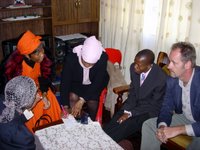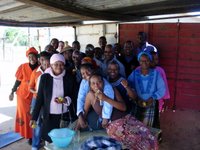Well, in South Africa, the dowry is called a “lobola,” and the tradition is still very much part of the fabric of the African culture, which creates a sometimes insurmountable obstacle for young men like my Congolese friend and teammate, Luc Kabongo,
 who has fallen in love with a wonderful South African woman named Petunia. This past Saturday I was part of a 6-person team (pictured at left) who traveled 250 kilometers south of Pretoria to meet Petunia’s family in a small mining township and negotiate a lobola on Luc’s behalf.
who has fallen in love with a wonderful South African woman named Petunia. This past Saturday I was part of a 6-person team (pictured at left) who traveled 250 kilometers south of Pretoria to meet Petunia’s family in a small mining township and negotiate a lobola on Luc’s behalf.When we arrived at their small rural home, Luc was not allowed to enter the gate of the house. That’s part of the tradition. He and Petunia had to wait outside until the negotiations were completed. Our “team” was unique in at least 3 ways. First, we had 3 women on our team. These negotiations are traditionally done only by the men of the family, and women are not even allowed in the room. Second, we had 2 Americans on the team—myself and Arthur, another NieuCommunities
teammate. And third, being a refugee from the Congo and separated from his family, Luc’s team was comprised of his spiritual family, not his biological family. Several times I was referred to as the “papa” on the team, in a sense standing in the place of Luc’s father.
 Their team was comprised of 6 men, somehow all related to Petunia, and most hoping to get something out of this deal (pictured at right).
Their team was comprised of 6 men, somehow all related to Petunia, and most hoping to get something out of this deal (pictured at right).Now, I’ve been a part of lots of negotiations in my lifetime, but never anything like this. First of all, we were negotiating for a person. And second, we were negotiating in the currency of cows. Yes, cows! Our team’s hope was to “buy” Petunia for 5 cows. Now, nobody really expects to receive cows anymore. At one time in the culture the payment really was made in cows, but now it is made in Rand, the South Africa currency, with 1 cow equaling 1,000 Rand (about $165).
Anyway, back to the negotiations. When we entered the room, Petunia’s family asked us to state our intentions. We said that Luc had found a beautiful flower in Petunia, and that we had come to pick the flower, to pay them for the flower, and to bring the flower home to Luc. They welcomed us into their home, they thanked us for coming, and then promptly asked us for 20 cows! We were all a bit stunned, but quickly relieved when one of Petunia’s uncle’s corrected the mistake and adjusted the request to 12 cows. They explained that 2 cows were for Petunia’s “head,” and that those were not negotiable. I’m still not sure I fully understand what it means to buy her “head,” but the primary meaning has to do with purchasing the right to bury her with your family. If you don’t buy her head, then she would be buried with her birth family when she dies. After presenting their demand, they left the room so that we could discuss their request and respond.
When they returned, we assured them that 12 cows was certainly a very fair price for Petunia, and that she was surely worth much more than that. But we humbly told them that all we had was 6 cows, and that we would be willing to give them all we had. We told them that we just didn’t feel we could promise to give them more than we actually had. We were sincere, and honest, and they accepted the offer. We also agreed to give a gift to each member of the family who played a significant role in raising Petunia. They will then give us a list of the gifts they each would like to have, which typically are things likes dresses, or suits, or blankets.
After the lobola was negotiated, Luc was brought into the house and introduced to the family. That was the very first time he
 and her family actually met…only after the price was fixed and the transaction was agreed upon was he allowed into the house and introduced to the family.
and her family actually met…only after the price was fixed and the transaction was agreed upon was he allowed into the house and introduced to the family.Luc and the negotiating team will return to the village in November with the requested gifts and to get his bride. They will slaughter a sheep, there will be a feast, and the lobola payment will be made. In African eyes, that day, and that transaction signifies marriage, and Petunia will be given to Luc. One month later there will be a wedding ceremony back in Pretoria, and for Luc and Petunia, on that day, they will be married in both African eyes and in God’s eyes.